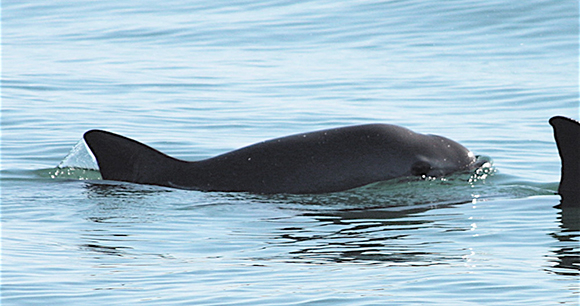
Deadly Illegal Fishing Continues in Porpoise Refuge
Wilmington, NC—After a two-year delay, the Council of the United States-Mexico-Canada Agreement (USMCA) voted unanimously yesterday to investigate Mexico’s failure to protect the critically endangered vaquita porpoise. Mexico has not enforced its own fishing and wildlife trade laws, and that failure is causing the near-extinction of the vaquita.
In 1997, the vaquita population in the Upper Gulf of California—the porpoise’s only home—was estimated at 570. Today, fewer than 10 are thought to exist. Vaquita are killed in illegal fishing nets set in the Upper Gulf to catch shrimp and a variety of fish species, including the endangered totoaba, whose swim bladder (or “maw”) is coveted in China and illegally traded.
The USMCA is a trade agreement between the three countries that took effect in 2020 as a replacement for the North American Free Trade Agreement. Following Wednesday’s decision, the USMCA Commission for Environmental Cooperation’s secretariat has up to four months to create a comprehensive “factual record”—an investigative report including technical, scientific, and legal information addressing Mexico’s enforcement efforts to stop illegal gillnet use imperiling the vaquita. The record, once compiled, should demonstrate ample evidence of ongoing illegal fishing in the vaquita’s habitat. If the commission determines that Mexico has failed to properly enforce the law, a separate committee can provide recommendations for further cooperative action.
“Mexico needs to face accountability from the international community to finally spur urgent action to save the vaquita,” said Alejandro Olivera, a senior scientist and Mexico representative at the Center for Biological Diversity. “These porpoises are still suffering from illegal and deadly gillnets in their habitat, and Mexico has been looking the other way for years as vaquitas spiral toward extinction. With the three-party trade agreement in place, Mexican authorities will have to comply or face consequences.”
Scientists report that vaquita recovery requires effective protection from gillnets throughout the species’ recent range, enabling the world’s most endangered marine mammal to reoccupy at least a small area in the Upper Gulf known as the Vaquita Refuge. A May 2024 survey identified 6–8 vaquita, compared to 8–13 seen in the 2023 survey. Unlike last year, no vaquita calves were observed, although one healthy yearling was spotted.
“As it is possible that only six to eight vaquita are left on the planet, the CEC must act urgently to encourage Mexico to finally enforce its fishing laws to save this critically endangered porpoise,” said DJ Schubert, senior wildlife biologist with the Animal Welfare Institute. “Without immediate and meaningful enforcement, the vaquita will join the growing list of species that have gone extinct due to human greed, ignorance, incompetence, and inaction.”
In 2021, the Center for Biological Diversity, the Animal Welfare Institute, Natural Resources Defense Council, and the Environmental Investigation Agency submitted evidence to the commission’s secretariat that Mexico is failing to protect the vaquita.
In response, the secretariat identified that “central issues remain unresolved in relation to the effective protection and conservation of the vaquita porpoise (Phocoena sinus) and the totoaba (Cynoscion macdonaldi) in the Upper Gulf of California.” Consequently, in 2022, the secretariat recommended the preparation of a factual record that the council should have voted on within 60 working days. Instead, it waited more than two years.
“The council’s delay in voting on whether to prepare a factual record has jeopardized the vaquita’s survival,” said Zak Smith, senior attorney and director of global biodiversity conservation at the Natural Resources Defense Council. “The vaquita is on the edge of extinction and the shortcomings of USMCA processes are part of that history. Urgent action was necessary two years ago and is still necessary today if the USMCA environmental provisions are going to meaningfully help conserve the vaquita.”
In February 2022, in response to a request from the same four animal welfare and conservation groups, US Trade Representative Katherine Tai initiated environmental consultations with the government of Mexico under the USMCA. These consultations specifically address Mexico’s USMCA obligations related to the protection of the vaquita, the prevention of illegal fishing, and the trafficking of totoaba. This is the first step in the USMCA’s formal enforcement process and could eventually result in trade sanctions under the trade pact.
“The illegal fishing and trading of totoaba maws for the predominantly Chinese market has led to decimation of the vaquita population, driving them rapidly towards extinction,” said Sarah Dolman, senior ocean campaigner at the Environmental Investigation Agency. “The Mexican government must take immediate and robust enforcement action to stop the illegal fishing and prevent the transnational totoaba trade to allow the vaquita population to recover.”
Marjorie Fishman, Animal Welfare Institute
[email protected], (202) 446-2128
Sarah Dolman, Environmental Investigation Agency
[email protected], +44 7869518514
Anne Hawke, Natural Resources Defense Council
[email protected], (202) 329-1463
Alejandro Olivera, Center for Biological Diversity
[email protected], (202) 849-8403, (en español)
The Animal Welfare Institute is a nonprofit charitable organization founded in 1951 and dedicated to reducing animal suffering caused by people. AWI engages policymakers, scientists, industry, and the public to achieve better treatment of animals everywhere—in the laboratory, on the farm, in commerce, at home, and in the wild. Follow us on Facebook, X (formerly Twitter), and Instagram for updates and other important animal protection news.
The Center for Biological Diversity is a national, nonprofit conservation organization with more than 1.7 million members and online activists dedicated to the protection of endangered species and wild places.
The Environmental Investigation Agency (EIA) is an international campaigning organization committed to investigating and exposing environmental crime and campaigning to protect endangered species and the natural world. Visit us at eia-international.org and follow us on Twitter @EIA_News.
NRDC (Natural Resources Defense Council) is an international nonprofit environmental organization with more than 3 million members and online activists. Established in 1970, NRDC uses science, policy, law and people power to confront the climate crisis, protect public health and safeguard nature. NRDC has offices in New York City, Washington, DC, Los Angeles, San Francisco, Chicago, Beijing and Delhi (an office of NRDC India Pvt. Ltd).